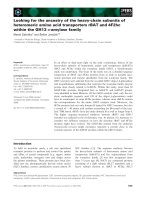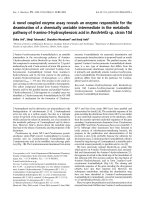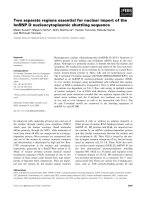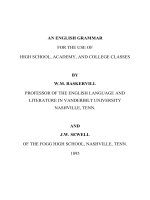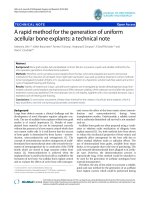Amino acids essential for the growth of eels anguilla anguilla and a japonica shigeru arai, takeshi nose, yoshiro hashimoto
Bạn đang xem bản rút gọn của tài liệu. Xem và tải ngay bản đầy đủ của tài liệu tại đây (349.59 KB, 7 trang )
Bulletinof the Japanese Society of Scientific Fisheries
38(7) 753-759 (1972)
Amino Acids Essential for the Growth of Eels,
Anguilla anguilla and A. japonica*
Shigeru
ARAI**, Takeshi
NOSE**, and
Yoshiro
HASHIMOTO***
(Received December 28, 1971)
Essential amino acids for the 2 species of eel, A. anguilla and A. japonica, were examined
by using an amino acid test diet.
Forty fish were grouped in each aquarium
and fed the
test diets for a period of 6 weeks.
In the both species, the fish fed diets deficient in each of
alanine, aspartic acid, cystine, glutamic acid, glycine, proline, and tyrosine grew as well as
those fed the complete amino acid diet.
The fish fed diets deficient in each of arginine,
histidine, isoleucine,
leucine,
lysine. methionine,
phenylalanine,
threonine,
tryptophan,
and valine failed to grow until the deleted amino acid was added to the ration.
It was thus
established that eels require the same 10 kinds of amino acid reported to be essential for
salmonids and others.
Ten amino acids have been shown to be essential for the growth of chinook salmon1),
sockeyesalmon2), rainbow trout3), and channel catfish 4) by HALVEDR
and his colleagues
withamino acid test diets. By examining the incorporation of 14C into amino acids after
intraperitonealinjection of [U-14C]glucose, COEEYet al.5) indicated that the plaice and
solehavea dietary requirement for amino acids similar to that of salmonids and channel
catfish.
In the previous paper6), one of the authors reported that methionine, threonine, tryptophanand valine were found to be essential and proline to be non-essential for the growth
of the Japanese eel, Anguillajaponica by using the amino acid test diet developed by HALVER7)
for salmonids. The results, however, were not so conclusive, since the test diet itself
wasnot so satisfactory for the growth of eels. This led us to study both the test diet and
feedingtechnique for eels and establish a far more reliable testing method8). By using
it, we examined the amino acids essential for the growth of 2 species of eels, A. anguilla
and A.Japonica. The results obtained clearly demonstrated that the both species of eel
requirethe same 10 kinds of amino acid as reported on the other fishes.
Materials
Experimental fish
and Methods
Elvers of A. Japonica were obtained in March 1971, from Kago-
shima Prefectural Fisheries Station and those of A. anguilla in April 1971, from a wholesale
754
dealer
of
freshwater
purified
casein-gelatin
ment
was
cm)
and
made
aeration
test
source
of
were
of
the
and
carboxymethylcellulose
fied
practically.
basal
weeks
for
thetized
in
diet
both
aquarium
Saturday
as
moist
eat
the
diet
diet
was
cation
by
with
reduced
of
out
The
eels
acid
in
each
and
and
diet
this
the
2 weeks.
fed
each
in
twice
diet
equal
Co.
Table
not
Ltd.
modi-
1 for
3 days
feeding
with
period
g after
fish
a day
was
being
were
This
made
6
anes-
grouped
except
extruded
the
the
nearly
was
feeding,
the
which
were
0.01
needle.
after
in
Ajinomoto
Forty
test
without
minutes
diet,
of
after
feeding
preliminary
nearest
were
pasty
eiperi-
supplied
experimental
of
Thirty
test
gelatin
leaving
other
simulated
previous
Table
* L-arginine.HC1
basal
to
syringe
was
Before
of
The
Fish
and
(20•~20•~
ingredients
weighed
The
25•Ž
a mixture
but
feeding
aquariums
mixture
other
the
liver
Sunday
into
eels
tank
easy
remainder
to
of the
time.
established
mixture
to
at intervals
diet.
it.
The
beef
of
minute.
product
japonica.
a day.
nylon
of
A.
was
w/v)
once
a 50-ml
casein
the
fed
loss
at
newly
a binder,
amino
experimental
were
from
replacing
as
of
noodle
diet
each
a
received
individual
%,
with
soybean,
start
in
acid
replaced
Tubifex,
anguilla.
kept
per
experiments,
of
the
heated
liter
a binder.
case
(1.2
they
siphoned
cellulose
growth
Each
as
on
A.
were
water
was
anguilla
the
in
a casein-amino
feeding
solution
for
when
fine
Test
tion
eels.
in
25•Ž
at
g
fish
of
used
of
omitted
in a urethane
each
and
the
on
diet
A.
start
0.6
0.4-0.7
acid-hydrolyzates
the
was
of
at
weight
and
well
rate
2 weeks
addition,
before
tanks
body
japonica
and
the
was
In
immediately
The
A.
casein-gelatin
and
in
Experimental
at
for
kept
order.
g in
chloride
kept
casein
were
methods
aquarium
they
amount
in
1.7
polyvinyl
each
protein
They
diet8)
testing
of
to
diets,
the
fish.
approximately
Feeding
50
live
with
was
amino
ingredients
that
work8)
1.
diet9)
and
of
acid
as
the
mixture,
untouched
the
differed
Composition
used
beef
only
liver
basal
adding
(Table
which
slightly
diet
modifi-
carboxymethyl1).
sustained
from
after
that
The
the
of
composiexcellent
the
amino
of the basal diet.
4 .0, L-histidine. HCI-H20 2.0, L-isoleucine 4.0, L-leucine 6.0, Llysine. HCI 5.0, L-methionine 2.0, L-phenylalanine 3.5, L-threonine 3.0, L-tryptophan
1.0, L-valine 4.5, L-alanine 4.5, L-aspartic acid , 7.5, L-cystine 1.0, L-glutamic acid 10.0,
glycine 5.0, L-proline 4.0, and L-tyrosine 3.0 g.
** U .S.P. XII Salt Mixture No. 2 with trace metals91.
*** Vitaminized cellulose powder . The amounts of vitamins added to the diet were same as
those reported by HALVER91.
755
acid test diet adopted for salmonids and channel catfish. Test diets were prepared by
deletinga single amino acid from the basal diet by replacing it with a-cellulose powder.
The diet was finally adjusted to pH 6.2-6.5 with 25 % NaOH.
Results
The average body weight at each weighing period and mortality
Table 2 for A. anguilla and in Table 3 for A. japonica.
Anguilla anguilla The experiment was conducted
are summarized in
from June 6 to July 20, 1971.
The fish on the diets deficient in each of arginine, histidine, isoleucine; leucine, lysine,
methionine, phenylalanine,
threonine,
tryptophan
and valine showed a loss of appetite
in 3 days and apparent loss of body weight at the end of 2 weeks.
Mortality was observed
in some groups, especially in the lysine- and valine-deficient ones.
Fig.
1.
Growth
complete
of
the
experimental
fish,
A.
anguilla
(-0-;
amino
As shown in Fig. 1,
acid-deficient
diet,
-•œ-;
diet).
the detrimental effects of depletion of some amino acids were apparent at the end of 4
weeks, and to all the groups of fish showing a retarded growth was then given the basal
diet for 2 weeks.
In the recovery test, the fish recovered their normal appetite within
3 days and showed a rapid growth.
in the 2-week recovery period.
amino acids, arginine,
threonine, tryptophan
histidine,
The percent body weight gain ranged from 19 to 49
These results clearly indicate that A. anguilla requires 10
isoleucine,
leucine, lysine, methionine,
and valine as essential for the normal growth.
phenylalanine,
On the other hand,
the eels receiving diets lacking each of alanine, aspartic acid, cystine, glutamic acid, glycine,
proline and tyrosine showed a growth comparable to that of fish on the basal diet, indicating that these amino acids are dispensable.
758
Anguilla japonica
1971.
The experiment
was conducted
from July 27 to September 6,
As shown in Fig. 2, the growth of eels was generally slow in the first 2-week period,
but much improved in the second 2-week period, probably due to acclimation to the amino
acid test diet.
ed in this case.
As mentioned above, the preliminary feeding with the basal diet was omittThe eels kept on the diets deficient in each of arginine, histidine, isoleucine,
leucine, lysine, methionine,
Fig.
2.
Growth
complete
of
the
phenylalanine,
experimental
fish,
threonine,
A. japonica
(-0-;
tryptophan
amino
and valine showed a
acid-deficient
diet
, -•œ-
diet).
remarkable loss of their body weight. The percent body weight loss ranged from 8 to
15% for the first 2-week period and 6 to 12% for the second period . In the recovery
test lasting for 2-weeks, the fish recovered their appetite within 3 days as in the case of A.
anguilla, and the percent increase of body weight was 19-32 % in the recovery, test. These
results clearly demonstrate that there is no difference in essential amino acids between
A. japonica and A. anguilla.
Discussion
By using the newly established testing method, the amino acids essentialfor the
growth of 2 speciesof eel, A. anguillaand A.japonica, wereclearlyrevealedto be the same
as required by salmonidsand channel catfish. It may be noteworthythat eels seemto
be much more sensitive to the lack of essential amino acids. A loss of appetitewas
recognizedin a period as short as 3 days, while in 2 weeks on salmonids1-3)and channel
catfish4). The recoveryof appetite in the deficienteels was also rapid, whenthe deleting
essentialamino acid was added to the ration.
Although serine and hydroxyproline
were not included in the basal diet, the eels
attained nearly the same growth rate on it as on the casein-gelatin
acids are therefore reasonably
classified as dispensable
for eels.
diet.
These 2 amino
In the previous worek6),
the eels receiving the glycine-deficient diet showed a growth apparently inferior to that of
the control.
In this experiment,
however, dispensability
of glycine was clearly demon-
strated in the both species.
Acknowledgement
This study was partly supported
by a grant from the Ministry of Education.
The
authors wish to express here their sincere thanks to Ajinomoto Co. Ltd. for the generous
supply of amino acids and also to Kagoshima
in collecting the experimental
Prefectural Fisheries Station for assistance
fish.
References
1)
2)
3)
4)
5)
6)
7)
8)
9)
3. E. HALVER,D. C. DELONO,and E. T. MERTZ: J. Nutrition, 63,95-105(1957).
J. E. HALVERand W. E. SHANKS: ibid., 72, 340-346 (1960).
W. E. SHANKS,G. D. GABIMER,and J. E. 14ALVER: Prog. Fish-Cult., 24, 68-73 (1962).
H. K. DUPREEand J. E. HA.LVER: Trans. Amer. Fish. Soc., 99, 90-92 (1970).
C. B. CowEY, J. ADRON,and A. BLAiR: J. Mar. Biol. Ass. U. K., 50, 87-95 (1970).
T. Nose: Bull. Freshwater Fish. Res. Lab., 19, 31-36 (1969).
J. E. HALVER: J. Nutrition, 62, 245-254 (1957).
S. ARAI,T. Nose, and Y. HAsmMoTo: Bull. Freshwater Fish. Res. Lab., 21, 161-178 (1971).
J. E. HALVER: J. Nutrition, 62, 225-243 (1957).
